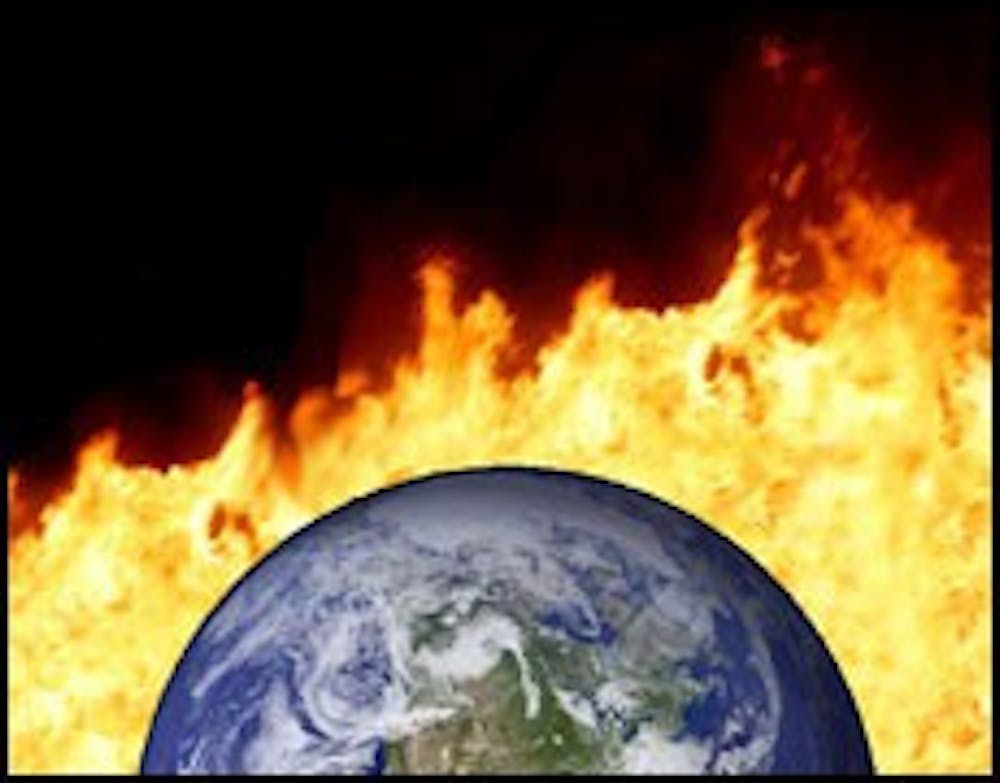Ah Arizona, the land of sunshine. For sun-worshipers who love laying out by the pool and soaking up the sun almost all year long, the Valley is an ideal place. But will that enjoyment turn into a nightmare if people keep on releasing as much carbon dioxide as they do now?
"Yes," says Alan Thorpe, chief executive of Great Britain's Natural Environment Research Council.
"Phoenix temperatures have been going up because of the urbanization," says Thorpe. "Previously vegetative surfaces were replaced by concrete buildings, and they hold the heat."
Last week, Thorpe gave two lectures regarding global warming as a part of the Distinguished Lecture Series hosted by the department of physics and astronomy. Thorpe presented chilling scientific evidence of global warming and assessed the implication of it for the Phoenix area.
"Global warming will significantly affect the reduction of rainfall in Phoenix and the amount of air pollution in the summer," says Thorpe. "It will go up, because a lot of the air pollution is created by the sunlight interaction with very warm polluted air that will produce smog."
Thorpe projected by summer 2080, Phoenix will have temperatures 10 degrees higher. For example, the current average July temperatures of 104 degrees (high) and 81 degrees (low) will increase to 114 degrees (high) and 91 degrees (low).
"People get concerned when temperatures at night get very high," says Thorpe. "With temperatures being 10 degrees higher, nightly minimums will get high as well, and people find that uncomfortable."
With air conditioning in Arizona, rising temperatures might be a concern yet says Thorpe, but during the heat wave in Northwest Europe in August 2003, 20,000 people died.
"There are a number of knock-on effects of changing climate and environment that people can find hard to cope with," says Thorpe.
Thorpe pointed out that by the beginning of the 20th century, the concentration of carbon dioxide in the atmosphere increased by 35 percent. If nothing is done to prevent the warming on a global scale, Thorpe says the temperatures will become warmer and sea levels will continue to rise.
"Essentially the more we pollute the atmosphere, the more we can expect these [negative] effects to occur," says Thorpe. "We are beginning to see points, such as melting of the Greenland ice sheet, that if we don't do anything about it, we will be witnessing potentially irreversible changes."
To prevent a disaster scenario where global warming could trigger a destructive climate change, Thorpe says switching from using fossil fuel to renewable energy is key.
"For me coming from England, I think that for Phoenix having so much sunshine, solar panels would be a great way to generate electricity," says Thorpe.
According to Thorpe, the British government has been responsive to the problem of global warming while the American administration has not. Barry Ritchie, a professor in the department of physics and astronomy, says that global warming is no longer a mystery to the American government.
"Over the course of 25 years, the administration started to recognize the problem of global warming," says Ritchie. "Today the question is no longer how much we know about global warming, it's what to do about it."
Mike Skowronek, a business graduate student, is doubtful about why American government is not doing much about it.
"The reason government is not responding to global warming is speculative," says Skowronek. "I think it's because of maintaining oil, since oil is the key to American dominance over the world."
Locally, Skowronek says he thinks that Phoenix should focus on improving public transportation, so people wouldn't depend on their cars as much.
"Since we are so behind everyone else [in America] in urban planning, Phoenix should work on better public transportation, such as the light rail," says Skowronek. "With the assumption, of course, that it won't run on diesel."




